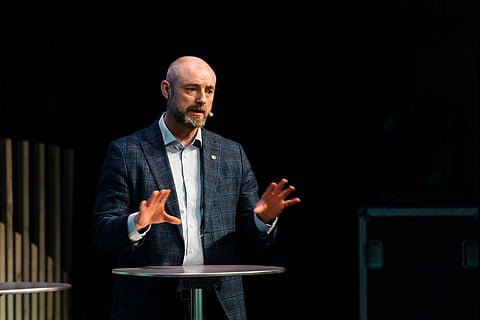

CEO of Norway's Seafood Companies, Robert H. Eriksson, asks the Government to halt downsizing for red zones in the traffic light system.
Photo: Sjømatbedriftene.
The Norwegian Parliament (Storting) yesterday debated the Green Party's (MDG) proposal for a rapid transition from a failing aquaculture industry. The majority agreed the Government should present a technology-neutral environmental flexibility scheme by 2024 while emphasizing it should apply to the volume of production that has been withdrawn due to the red in the traffic light system. As a result, the Norwegian Seafood Companies (Sjømatbedriftene) have asked the Minister of Fisheries to halt the downsizing.
A parliamentary majority consisting of the Labour Party, Conservative Party, Centre Party, Progress Party, Socialist Left Party, Liberal Party, and the Green Party agreed yesterday that the Norwegian Government should present a technology-neutral environmental flexibility scheme by 2024. The decision was made after the Business Committee delivered its recommendation on the MDG's representative proposal for a rapid transition from a failing aquaculture industry.
In addition, this majority emphasized that the scheme should apply to the volume of production withdrawn due to a red traffic light. Norwegian salmon growth target for 2024 was set at the end of March. The color-coding in the traffic light system then marked two zones in red, claiming precisely that environmental issues were being prioritized. The total reduction was estimated at approximately 11,400 tons of production capacity.
Therefore, following these new guidelines that have emerged from this broad cross-party majority in the Storting, Seafood Companies CEO Robert H. Eriksson thinks that Fisheries Minister Cecilie Myrseth should halt the downsizing of the traffic light system.
"In practice, this means that the Parliament has given the Government a clear and distinct task to present an environmental flexibility scheme by the end of the year. The only sensible thing the Minister can do following this is to halt the downsizing in the traffic light system," Eriksson said.
The CEO of the business organization representing all sectors of the Norwegian seafood industry also emphasized that both Sjømatbedriftene and the research communities or aquaculture committees have been clear that the current reduction in the traffic light system has not worked as intended.
In fact, among the most significant recommendations of the report presented in September by the Aquaculture Committee - tasked by the Government to evaluate the design of a comprehensive permit system - the most striking was precisely that of putting an end to license reductions in red salmon farming areas under the current traffic light system.
"The Minister has announced that she will present the aquaculture report during the spring of 2025, and that she is mandated to present an environmental flexibility scheme. All this needs to be in place and considered in a holistic context before implementing downsizing; otherwise, it would be hard to understand," stated Robert H. Eriksson.
"The downsizing will have dramatic consequences for the industry. It hits hard and brutally. We have already seen that some actors have shut down production and laid off people as a result of the downsizing. Therefore, I ask the Minister to listen to the industry and the mayors in the area, and not let pride get in the way of this issue, but instead show wisdom and turn in time," he added.
This is not the first time Myrseth has been asked to postpone the reduction until after the aquaculture report has been submitted. Previously, fourteen mayors, the county council in Vestland, business stakeholders, and Sjømatbedriftene itself have already requested this. However, until now - and even though she has been in favor of a comprehensive review of all aquaculture permits - the Minister of Fisheries has always stated that not reducing production is out of the question.
"The aquaculture industry is important for Norway, and there is broad political consensus that we must have sustainable aquaculture management. I understand that it is challenging for farmers on the West Coast who have to reduce their production, but I believe that environmental considerations are so important that they must come first," she said last month.
Now, the CEO of Norwegian Seafood Companies again stresses the need to halt the downsizing of the traffic light system and illustrates it with a concrete case. Eriksson highlights the family-owned Svanøy Røykeri as an example of a company that has decided to close its operations due to the Government's policy.
"I hope reason will prevail, and therefore ask Myrseth to pull the emergency brake and retract her decision on downsizing. The proposed capacity adjustment affects not only the breeders but also food producers, slaughterhouses, and processing plants. In practice, this means fewer jobs, less value creation, and less high-quality Norwegian food production," Robert H. Eriksson concluded.
